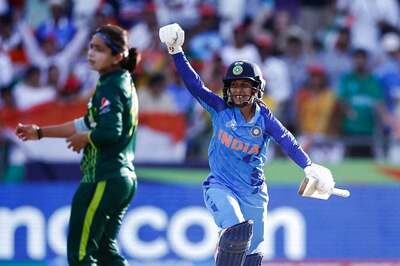
views
Kolkata: The Trinamool Congress cashed in on the discontentment of non-Bengali voters, majorly Telugus, over reports of privatisation of the Railways in Kharagpur Sadar, while the fear of National Register of Citizens (NRC) among members of the minority committee became a deciding factor in Kaliaganj.
This is for the first time that the ruling camp, led by Chief Minister Mamata Banerjee, has won the two Assembly seats in the state.
Of the approximately 2.24 lakh voters in Kharagpur Sadar constituency, about a lakh are non-Bengalis, majorly Telugus, and their disappointment with the Centre’s privatisation moves proved disastrous for the BJP in the by-election in Bengal.
Most of these voters, who work in or are associated with the Railways, have become a key factor in Kharagpur’s politics.
In Kaliaganj, the NRC issue went against the BJP as most of the minorities voted for the Trinamool Congress. Sensing the possibility of such a scenario, the ruling camp had put up banners, hoardings and informative leaflets that helped people understand the nuances of the NRC process and why Banerjee has been vehemently opposing it.
However, the winning margin is much less here as a majority of Rajbonshi community, which is in favour of NRC and makes up for nearly 50% of the population, voted for the BJP.
Here, the TMC’s Tapan Deb Singha beat his nearest BJP rival Kamal Chandra Sarkar by 2,304 votes. The Congress and Left Front’s joint candidate Dhitasree Roy finished third. The ruling camp has won all the three Assembly seats — Kaliagunj, Kharagpur Sadar and Karimpur — where by-elections were held on October 25.
Following the thumping victory, the TMC’s internal review found the party has managed to swing nearly 60,000-70,000 votes in Kharagpur Sadar and Kaliaganj which is more than 20% of all the votes polled in these two constituencies.
Kharagpur Sadar had always been a Congress bastion with Gyansingh Sohanpal winning the seat since 1982 for seven consecutive times.
In the 2016 state elections, BJP state unit chief Dilip Ghosh had wrested the constituency from Sohanpal by about 6,000 votes. Ghosh was again declared victorious in the 2019 Lok Sabha elections by a margin of 44,961 votes.
This time, TMC's Pradip Sarkar defeated Premchandra Jha of the saffron party by a margin of 20,788 votes.
However, not just Telugu and other non-Bengali-speaking voters played a key role, the TMC is said to have silently made a concerted effort to reach out to about 15,000 women voters working in self-help groups.
Also, ahead of the polls, the TMC had released its manifesto in Telugu with some specific promises in an innovative pocket calendar format. “This clicked and we managed to get a decisive share of their votes that was earlier with the BJP,” a senior TMC leader said.
In Karimpur, the TMC continued with its mandate that it had received in the 2016 Assembly and the 2019 Lok Sabha polls. This time, it won the seat with only a larger margin of 23,910 votes.
“(Poll strategist) Prashant Kishore’s effort to reunite the party factions in the three seats also helped the TMC create history this time. In order to synchronise and focus all the efforts of the party, we reached out to all stakeholders on-ground, including erstwhile party members, various factions and loyalists who had been side-lined for a while, and resolved all differences. This helped the cadres mobilise towards one singular effort.”
Internal review further gave credit to some of the first-of-its-kind campaign planned by Kishor like flash campaign, promotional helium balloons, video vans and mass distribution of local manifestos. The leadership is now hoping that all these factors would help the party in the crucial 2021 Assembly elections in the state.




















Comments
0 comment